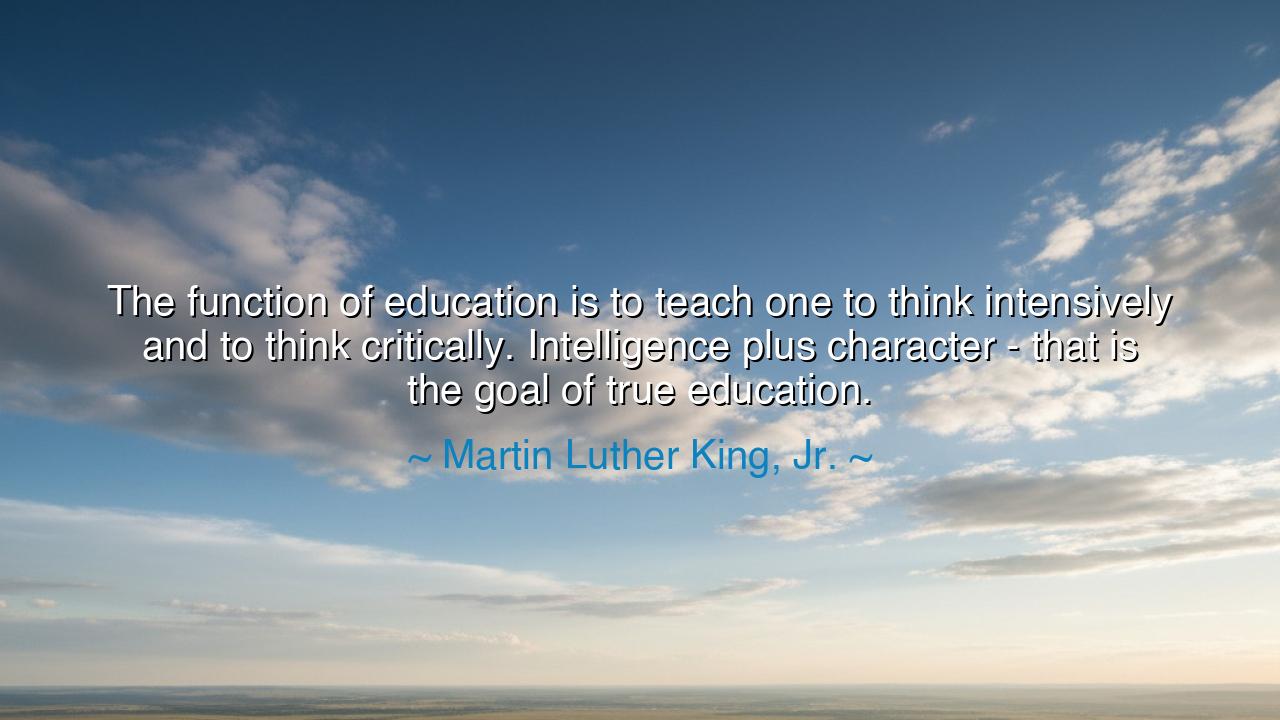
The function of education is to teach one to think intensively
The function of education is to teach one to think intensively and to think critically. Intelligence plus character - that is the goal of true education.






The words of Martin Luther King, Jr. — “The function of education is to teach one to think intensively and to think critically. Intelligence plus character — that is the goal of true education.” — ring like a bell through the halls of time. Spoken by a man whose life embodied wisdom and moral courage, these words remind us that education is not merely the sharpening of the mind, but the shaping of the soul. King, who saw both the brilliance and the blindness of modern civilization, knew that knowledge without virtue becomes a weapon. The goal of true education, he said, is not cleverness, but wisdom; not power, but purpose; not just the intellect to reason, but the heart to do what is right.
To think intensively is to dive deep into the ocean of understanding — to question, to analyze, to reason beyond the surface. But to think critically is to see with moral clarity — to discern truth from falsehood, justice from convenience, good from evil. King understood that these two must walk hand in hand. A society filled with intelligent minds but empty hearts breeds cunning, not compassion. Intelligence without character leads to cruelty disguised as progress. History, he warned, is full of brilliant minds who used their intellect to enslave rather than liberate, to destroy rather than to build. Thus, education, to be worthy of its name, must cultivate both the mind and the conscience.
The origin of this quote comes from an article Dr. King wrote in 1947 for the Maroon Tiger, the campus newspaper of Morehouse College, when he was still a student. Even as a young man, he was already grappling with the moral questions of his time — segregation, war, inequality — and saw how many educated people defended injustice with eloquence and reason. This troubled him deeply. If education could produce men who justified oppression, what then was its purpose? His answer was timeless: education must not only teach us how to think, but also what to live for. It must align the power of the intellect with the light of morality.
Consider the tale of Oppenheimer, the father of the atomic bomb — a man of extraordinary intelligence but haunted by the consequences of his creation. His brilliance unlocked the atom, but the world’s use of his discovery unleashed devastation. In his later years, Oppenheimer reflected that scientific progress without ethical restraint leads to ruin. His story is the living echo of King’s teaching: that intelligence alone is not enough. True greatness comes when intellect bows to the guidance of conscience, when knowledge is used not for destruction but for the upliftment of humanity.
Throughout history, the balance of intelligence and character has shaped civilizations. Ancient Athens, radiant with learning, fell when wisdom gave way to vanity. The Roman Empire, mighty in strategy and art, crumbled when power outgrew virtue. Yet wherever education has kindled both thought and morality — from the monastic scholars who preserved knowledge through the Dark Ages to the teachers who guided the civil rights movement — humanity has risen anew. The nations that endure are those that teach their children not only to solve problems, but to seek justice, not only to achieve, but to serve.
Dr. King himself embodied this truth. His intellect was razor-sharp, forged in theology and philosophy, yet it was his character — his faith, compassion, and moral courage — that moved mountains. He wielded the power of thought not to dominate, but to awaken. Through words and actions, he showed that education’s highest purpose is to unite knowledge and love — the head and the heart — into one radiant force for good. When he spoke of “true education,” he was calling for a revolution of spirit, one that would replace selfish ambition with service, and cold calculation with conscience.
So, O seeker of wisdom, heed the lesson of Martin Luther King, Jr. Do not measure your education by the degrees you hold, but by the truth you stand for. Do not pursue knowledge for pride, but for purpose. Let your intelligence be your lamp, but let character be the flame that fuels it. Think deeply, yes — but also feel rightly. In a world dazzled by cleverness, be one who chooses goodness. For in the harmony of intellect and virtue lies the power to transform not only yourself, but the destiny of humankind.
Remember: “Intelligence plus character — that is the goal of true education.” It is not the pursuit of information, but the cultivation of illumination — the wisdom to use your mind in service of the greater good. To live this truth is to become, as King did, both scholar and servant — a torchbearer for a future where thought is guided by love, and knowledge serves the cause of humanity.






AAdministratorAdministrator
Welcome, honored guests. Please leave a comment, we will respond soon